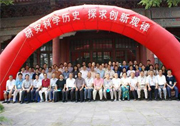| 中文题目: | 从“改进农作法”到“精耕细作”——延安大生产运动时期“精耕细作”提法的由来 | ||||||
| 英文题目: | A slogan and it’s story: the making of the idiom of jinggengxizuo | ||||||
| 作 者: | 曾雄生 | ||||||
| 刊物名称: | 中国经济史研究 | ||||||
| 发表年度: | 2018 | ||||||
| 卷: | |||||||
| 期: | 4 | ||||||
| 页码: | 153-168 | ||||||
| 中文摘要: | 成语"精耕细作"是对中国古老农作法最主要特征的高度概括。这一特征在春秋战国时期形成以后一直存留在千百年来农民的实践之中,但作为一句成语则是在20世纪40年代以后才开始流行,而它的形成又与当时中共领导的延安大生产运动,特别是在运动中被树立为典型的劳动英雄吴满有等模范人物有关。吴满有等人通过"改进农作法",提高产量,支援边区建设,经过媒体报道,其经验被总结为"深耕"、"深耕细锄"或"深耕细作",而后这些语汇又可能是受到国统区传入的"精耕"一词的影响,最终在1943年底及1944年定型为"精耕细作",并且在1957年经毛泽东的再次提及之后,受到广泛的重视,成为新中国农业发展和经济建设的指导思想。它的使用及影响也已超出农业之外。本文采用概念史的方法,对这一成语的形成过程,对精耕细作的内涵、技术特点及其在棉花生产中的运用进行了梳理,以期对人们经常说到的这一成语有一个更深入完整的理解。 | ||||||
| 英文摘要: | Jing Geng Xi Zuo (精耕细作,Intensive cultivation) is a Chinese idiom that generalize the most important characteristic of traditional agriculture in China. This feature has remained in the practice of peasants for thousands of years since it was formed in the spring and autumn and warring States Period. However, as an idiom, it began to get popular after the 1940s, and its formation coincided with that of the Yan'an Large production movement that led by the Communist Party of China in liberated area, especially with the typical labor hero Wu Manyou and other exemplary characters that established in the movement. Wu Manyou and the others had increased production by improving farming practices to support the border area construction, after the media reports, his experience was summed up as "deep-plowing and meticulous hoeing", and finally stereotyped as " Intensive cultivation " at the end of 1943 and 1944, under the influence of the words "fine tillage" that introduced from the Kuomintang area, and in 1957 after Mao Zedong's mention again, it receives the widespread attention, and becomes the New China agriculture development and the economic construction guiding ideology. It has been used and affected beyond agriculture. Combining the formation process of this idiom, with the mythology of concept archaeology, this paper combs the intension of intensive cultivation, technical characteristics and its application in cotton production. In order to have a more in-depth and complete understanding of this idiom that people often speak of. | ||||||





